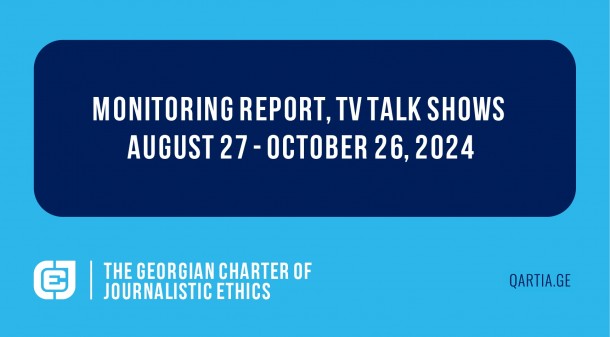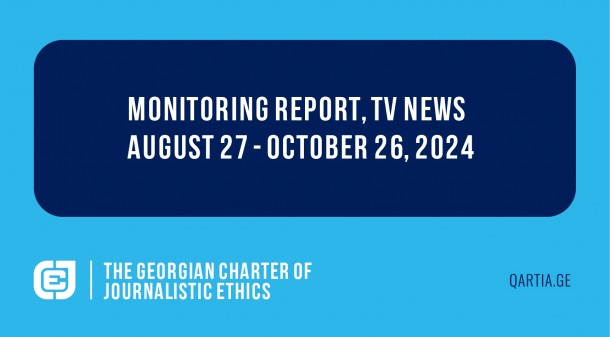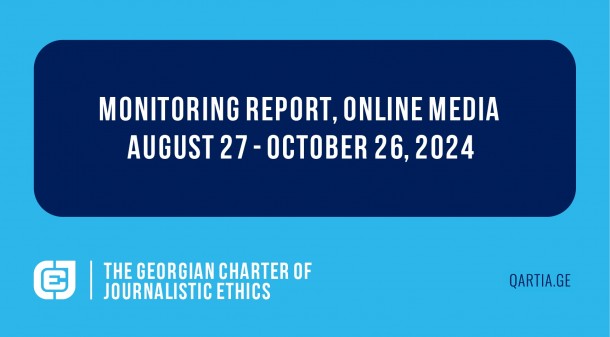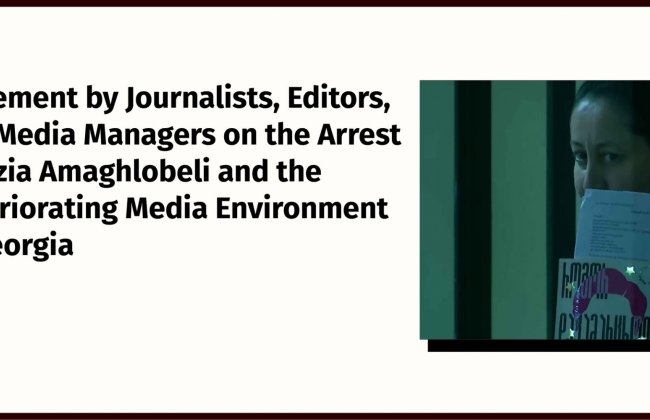10.07.2014
Tbilisi, 10 July 2014 - The Charter of Journalistic Ethics, an
independent, non-profit professional journalist association that
promotes values of freedom and democracy, systematically monit
Tbilisi, 10 July 2014 - The Charter
of Journalistic Ethics, an independent, non-profit professional
journalist association that promotes values of freedom and
democracy, systematically monitored media coverage prior to the 15
June local elections. Additionally, the monitoring has continued in
the weeks preceding the local elections’ run-off, scheduled for 12
July. This project is conducted in cooperation with the Slovak
media-monitoring organization MEMO 98 and with the support of the
National Endowment for Democracy (NED).The Charter & MEMO 98 have sought to evaluate the broadcast media’s performance in providing objective and balanced coverage of contestants and their political parties so the citizens of Georgia can make well-informed choices at the ballot box. The project’s findings have been determined through a well-defined and rigorous methodology and are not intended to support any one candidate or political party, but the integrity of the media environment as a whole during the campaign season.
On 1 April, the Charter commenced the monitoring of two public broadcasters (GPB – Georgian Public Broadcaster, Adjara TV), five private Tbilisi-based TV channels (Imedi TV, Kavkazia TV, Maestro TV, Rustavi 2 and Tabula TV) and six regional channels (Channel 25 from Adjara, Gurjaani TV from Kakheti, Kvemo Kartli TV from Kvemo Kartli, Odishi TV from Samegrelo, Rioni TV from Imereti, Trialeti TV from Shida Kartli).
The Charter uses methodology that has been developed by MEMO 98 which has carried out similar projects in 48 countries over the last 15 years. Given its comprehensive content-oriented approach, it is specially designed to provide in-depth feedback on pluralism and diversity in media reporting, including coverage of chosen subjects/themes. As such, the outcome of the monitoring is a detailed analysis and evaluation of the current level of political diversity in media reporting, examined in the proper context. Both partners will also issue a comprehensive final report, including recommendations for potential improvements.
Following is the summary of the main findings from the third phase of the monitoring, covering period 16 June – 3 July 2014 (previous phases covered 1-30 April and 1 May-6 June 2014 ):
EXECUTIVE SUMMARY
- Most of monitored media, including public broadcasters, in the last days of the 15 June election campaign provided diverse coverage of contestants, thus enabled voters to make an informed choice at election day.
- As previously, the post-election media coverage was dominated by the reporting on the activities of the government and two major political parties, with the United National Movement (UNM) presented more in all Tbilisi-based channels, but Maestro TV.
- While the country expects mayoral run-offs in 8 different municipalities, national channels gave substantial coverage to Tbilisi mayoral run-off, with Davit Narmania (GD) given more in all national and Tbilisi-based channels, except Imedi TV.
- Regrettably, channels continued in somewhat superficial coverage focusing on general campaign. However, since the general pace of the campaign was rather low-key and somewhat dry, limited analytical approach could be partially attributed to this fact.
![[pdf]](http://www.memo98.sk/img/ico_pdf.gif) Full
report
Full
report![[pdf]](http://www.memo98.sk/img/ico_pdf.gif) Charts:
National TV
Charts:
National TV![[pdf]](http://www.memo98.sk/img/ico_pdf.gif) Charts:
Regional TV
Charts:
Regional TV






